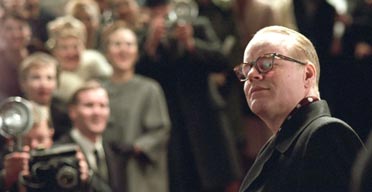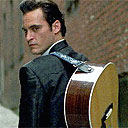It goes without saying that the nominations for the 78th Academy Awards are a good thing - or, at any rate, less depressing than usual. The Academy has turned its back on blockbusters, and voted instead for films on matters more chewy: gay cowboys (Brokeback Mountain), a transgendered man (Transamerica), corruption in Africa (The Constant Gardener). More cheering still is the nomination of Paradise Now, which tells the story of two Palestinian suicide bombers, for best foreign film. I saw a trailer, and even those few minutes were enough to reveal that its theme - suicide bombers are human beings, too - is not one that many Americans are likely to embrace, even if the pill is sweetened with a tub of popcorn and bucket of Coke.
Even so, when the nominations were announced last week, there was one stunning omission: Michael Haneke's Hidden, a study in post-colonial guilt and voyeurism that many people regard as the film of the year, if not the decade. According to metacritic.com, a website that tracks critical reaction to movies, Hidden was one of the five best-reviewed films in the US. But it was nowhere to be seen on Oscar's precious lists. Hidden (which was released in this country last week), is in French, yet that country's entry for best foreign film was Joyeux Noel, a fictionalised account of the Christmas Day truce in 1914, when French, German and Scots troops played football in no man's land - which is fine, but not in the same league as Haneke's troubling masterpiece.
The film is about a TV arts journalist, Georges, a man with a vile secret whose family is terrorised by a series of videotapes sent to them anonymously; tipped off by Haneke at a Cannes press conference to pay attention to the closing credits, audiences now stay in their seats during its final seconds, looking for clues as to who was, after all, behind this campaign of surveillance - with sometimes bizarre results (I cannot say more; above all else, this is a brilliant thriller and, as such, its plot must be guarded like a jewel).
The omission from the Oscars, however, has nothing to do with the dark arts; it is - how the heart sinks at this - merely down to bureaucracy. The Academy refused to accept the film when it was submitted by Austria, where Haneke was born, because its dialogue is in French, and the rules specify that a film must be in the principal language of the submitting country. But since the rules also say that the creative talent from the submitting country must have 'artistic control' of the film - in other words, be its director - France had no reason to pick the film either.
This year three further pictures have fallen foul of the Academy in this way, most notably Private, a wonderful film about a Palestinian family whose house is taken over by the Israeli army. Italy submitted the film but it was disqualified because its dialogue is in Arabic and Hebrew. Of course, you might say that none of this matters: that the Oscars are a venal confection about which we should not get too worked up. But in the case of small films from far-off places, it matters very much. An Oscar nomination means people are more likely to see a film, and that distributors are more likely to make it available to them. I would like lots of people to see Hidden, with its forensic depictions of the casual cruelties that the powerful (here, the French) must inflict on those they have left with nothing to lose but their lives (the Algerians of the banlieus).
But there are other reasons why, in this instance, these rules infuriate. The immigrant experience, the unceasing migration of people from east to west, is the great story of our time. How can this story be adequately told if rules are in place that deny its very existence? People move; they live in lands whose tongues are not their own. As a result, the culture they produce is collaborative, hybrid - impure, if you take the Academy's line. All this is doubly strange when you consider that America is, theoretically, the home of the immigrant, a nation whose very strength is supposed to lie in the fact that a man with a weird accent can arrive on its shores with nothing, and within a decade be the owner of a house and a car and a peculiarly shiny kind of patriotism. America used to like to tell these stories of itself. No longer. Crash is an extremely rare exception - and, in any case, is about as subtle as a jackboot. When I tried to think of another recent American film about the immigrant life, all I could conjure was the woeful Spanglish, in which Adam Sandler employs a Mexican nanny. Its tagline: 'A comedy with a language all its own'. Well, Hidden also has a language all its own. I don't mean the French which Majid, Georges's boyhood friend, uses so eloquently. This is the language of impending, catastrophic loss, and it is one the Academy - and America - would do well to learn before it is too late.
Stars in their eyes
The Dubai-owned company that runs London's Madame Tussauds will soon cease exploring the solar system in its green-domed Planetarium. In future, visitors will be invited to embark on a voyage around 'the worlds of fame and celebrity'. What grim news. Thanks to light pollution, the only place you can see the stars in a city is in a planetarium. So I pay a valedictory visit. I have forgotten - in the 25 years since I was last here - how bizarre Tussauds is. You cough up your £24 (yes, £24), and stand in front of the Jamie Oliver, Robert Mugabe and Archbishop Makarios (surely you remember: he was President of Cyprus), and you just think: why? This only increases when you visit the Planetarium and take in a view of the earth as seen from Mars - from which vantage point Posh and Becks seem even more irrelevant than usual. Its critics are now calling for Tussauds to invest in the Planetarium, whose presentation has, over the years, dwindled to a paltry 15 minutes. Alas, this will never happen. Those in charge know they would be on a hiding to nothing. Why remind already bewildered visitors of the fact that the lives of the likenesses they have paid to see are mere nanoseconds on the great clock face of the universe?
· What do you think? Let us know at review@observer.co.uk



